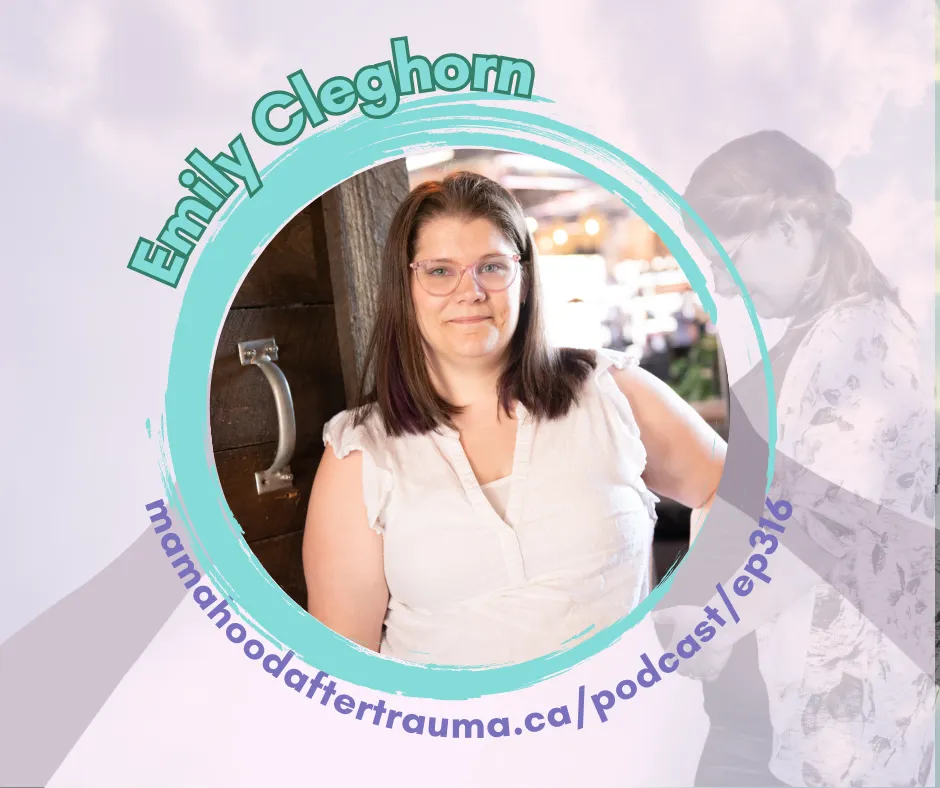
Discover a sanctuary for healing and growth in motherhood with the Mamahood After Trauma Podcast hosted by Emily Cleghorn. Dive into candid discussions and practical tips on parenting amidst trauma recovery.
Join Emily and her guests as they navigate the complexities of raising children while prioritizing personal healing. Find solace, strength, and joy in the beautiful chaos of mamahood after trauma.
Listen now!
Featured Posts

3 Surprising ways your trauma is affecting you

Today I want to talk about three ways that your trauma could be affecting you. Your life in your everyday, day to day mamahood. All of the things, because as much as we'd like to think our trauma doesn't impact every area of our lives, it really is like a spider and it spreads out and reaches out and it impacts. Every single aspect of our lives, and it doesn't matter if it's five months ago, five years ago, 25 years ago, 55 years ago.
It does not matter if you have unresolved trauma in your background. It is affecting the way you live.
So, What are the three ways that trauma is affecting you? And I'm speaking from personal experience. I'm also speaking from experience as a coach who's worked with clients who've had, who've experienced these.
So I am of the firm belief that we are there. There is nothing about us as individuals that is in isolation, meaning your physical health, your digestive system, your reproductive system, your um, immune system, your metabolism, all of these things do not work in isolation.
They all are interconnected in some way, shape, or form because they're all part of you. On the same token, your physical health, your emotional health, your mental health and your spiritual health are all also interconnected.
When I think of people, I think of a big jigsaw puzzle. All of the pieces are interconnected and affect each other. If you're, if you're missing a middle edge piece, the puzzle is not gonna go together properly. Right?
So when we are embarking on a healing journey, we need to consider all of the pieces and work on all of the pieces.
The first way that your trauma is affecting you, specifically in Mamahood, is you may be easily triggered by your children, especially in the toddler years because your toddler is learning how to navigate all of those big emotions that they have, and they don't have the tools that they need to work through and manage all of those emotions.
They just know that they feel these really big things and. It's overwhelming for them. They don't know how to manage anger. They don't know how to manage their frustration or their sadness or their, their hunger, right?
They're just hungry and they want food now, and maybe depending upon the age of the child and where they are developmentally, they have the words for that, but they may not always remember that they need to use the words, so they scream or they cry.
Depending upon what your trauma was, if loud noises or clingy people, people touching you, if those things have a connection for you to negativity, a negative experience, then of course, It's going to trigger you when your toddler is clinging to you and screaming and crying and going on, of course that's going to happen.
The thing is now is that that child does not understand your trigger. That child is not responsible for your trigger. Your trigger is your trigger.
So, while it's not your fault that you're triggered because of a past experience you had, and now it's coming out with your child, it is your responsibility to learn, to acknowledge the trigger, to, to acknowledge what's going on.
And to figure out, to gather the tools yourself to learn how to manage that work through it.
The biggest wake up call for me was kicking a hole in my laundry room wall because I was triggered by my child screaming and screaming and screaming and screaming and screaming and screaming, my nervous system just couldn't deal anymore. I got so mad and I kicked a hole in my wall. Instantaneously, I knew that was not the right way. That was not a healthy way to manage my emotions. That's not how I want my son or my daughter to manage their emotions when they get really angry. I don't want them kicking holes in my wall. That's expensive and a pain in the neck to fix. So how then do we manage our triggers?
Since that episode where I kicked a hole in my laundry room wall, I have created a action plan, a five step action plan that I can do on the go because you never know when a trigger is going to come up and it's worked for me. It's worked wonders for me. I will link below so if you are finding that you are easily triggered, you are able to go and download that, it's free. My gift to You, one Trauma healing Mama to another.
Click here to download the action plan
Another way that your trauma could be affecting you is your digestive health.
Perhaps you carry extra weight around your midsection, like around your belly button. Maybe this is something that bothers you and maybe it's something that doesn't.
Typically, if you are living. Constant low level stress with a, with a constant low level stress, your body is addicted to cortisol. You have too much cortisol. Cortisol is the stress hormone. It's the hormone that we create in stressful situation, which is most cases, all cases trauma.
So when you carry, when your body has a lot of cortisol, you tend to carry more weight around your midsection and in order for that to take care of itself and for your digestive system to start working at an optimal level, your stress response needs to be deactivated.
I don't know if you're like me at all, but for such a long time, such a long time, like most of my life, my stress response got stuck on meaning that my body, this is true to this day. My body struggles, blacks. I've gotta be doing something busy.
That's a whole other episode on its own...Are you addicted to being busy?
There are a number of ways in which to get your body working. The digestive system, your hormones, all of that stuff works together and working at an optimal level.
The third way that your trauma could be affecting life and your mamahood is a general disbelief in self worthiness, what you deserve.
This is something that is really hard for a trauma surviving mama acknowledge and really give it the time that it deserves.
When my daughter was first, I didn't believe that I could be a good mom, I didn't believe that I was a good person, I didn't believe that I deserve my husband to be as good as he is.
I am going go out on a limb to say that you -- know it or not-- Probably also do not because for so long the words and actions of other people told you that you don't deserve goodness. You're not good enough, you're not pretty enough, you're not smart enough. You're not, you are not, you are not lovable.
All of these things are LIES!!!
Mama, I am here today to tell you those are lies.
You are good enough, you are a good mama. You are doing your best. You were given a crappy hand and now you are taking responsibility. You are the only one who can.
You know as well as I do that no one is coming to save you
No one came to save me.I had to do it myself. Outside of God. He loves you and he's there with you. He gave you the ability out of it.
Let's recap
1. You're easily triggered
2. Digestive system upset, Extra weight section.
3. You struggle to speak up with for yourself, struggle to advocate for low self-worth.

Don't miss an episode again!
Subscribe to get updates sent to your inbox!
© Copyright Emily Cleghorn 2025


